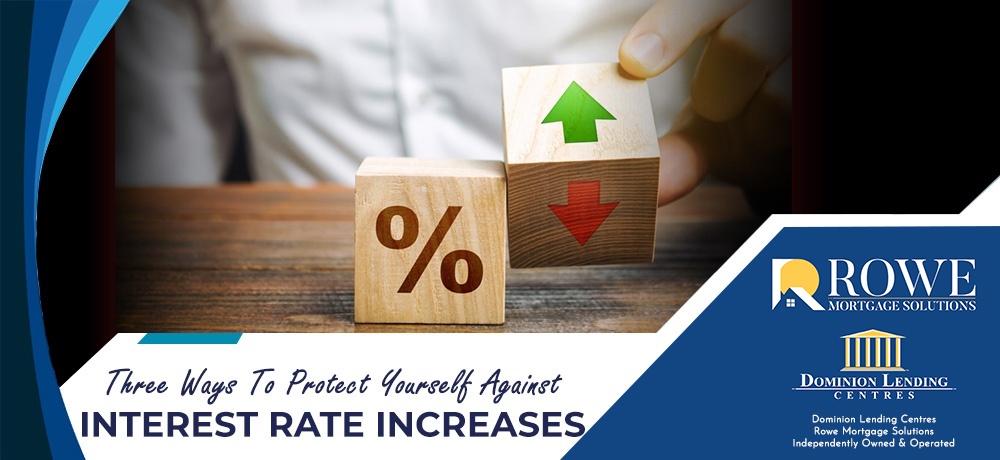If you're thinking about taking a variable interest rate, you're going to want to read this blog post. With the prime rate dropping, variable interest rates are coming back into the fold, and a lot of homeowners and first-time buyers are beginning to inquire about taking on a variable interest rate instead of the fixed. Now there is some risk involved in taking on a variable, but there's also some important features that we need to know about if we're going to consider a variable interest rate. So let's dive in. To begin, what a lot of Canadians don't know is…


Blog by
Cody Rowe - Mortgage Broker
-
What You Need to Know About Variable Interest Rates
CLICK HERE TO READ THE FULL ARTICLE »
-
Bank of Canada Makes Another Jumbo Rate Cut
Earlier this month, the Bank of Canada made another jumbo rate cut of half a percentage point (0.50%) off the prime lending rate. Let's take a look at what this means for you as a current or future homeowner, as well as what this means for the state of our economy in Canada. To begin, if you have a variable rate mortgage, since June you've seen your interest rate be cut by 1.75%, which is a major drop in interest rate. To put this into context, what this means is that for every $100,000 of mortgage money that you currently owe on…
CLICK HERE TO READ THE FULL ARTICLE »
-
Cash-Back Vs Cash Bonus…What’s the Difference?

To compete for business, banks will often incentivize homeowners by offering either cash-back or cash bonuses to earn their mortgage business.
This isn’t just a way of earning business, but by dangling a carrot and getting you focused on the cash it steers the conversation away from the fine print and important features of the mortgage that could easily cost you more money in the long run.
CLICK HERE TO READ THE FULL ARTICLE »
-
How Alternative Financing Can Help When Rates are High

With interest rates being the highest they’ve been in over 10 years, along with the stress test reducing what buyers qualify for this has created a number of issues for buyers attempting to find an approval for their home purchase or homeowners to complete their refinancing.
For this reason, among many others alternative financing is becoming increasingly popular as people try to find creative ways to get the job done.
Alternative financing allows current and future homeowners access to bank programs otherwise unavailable through traditional forms of financing.
Simply put, these programs are very versatile and open the door of possibilities when you keep running into rejections from your traditional lender.
CLICK HERE TO READ THE FULL ARTICLE »
-
Common Mistakes When Purchasing an Investment Property (Part 2)

1. Not Making the Mortgage Re-Advanceable
This tip stems from tip #3 from the first part of this series where we discuss putting your attention towards the type of financing that leaves room for cash flow and avoiding the common pitfall of thinking the lowest possible interest rate should be the primary focus of your financing.
CLICK HERE TO READ THE FULL ARTICLE »
-
Common Mistakes When Purchasing an Investment Property (Part1)

With the real estate market on its way to a correction in market values for many parts of Canada, savvy investors who are prepared will have some great opportunities to purchase new assets to add to their portfolios.
CLICK HERE TO READ THE FULL ARTICLE »
-
Three Ways To Protect Yourself Against Interest Rate Increases

‘How low can you go?’ has been the mantra for interest rates for years since the start of the pandemic. However, when there is a chance of a possible interest rate increase to the prime lending rate, it is common to wonder whether now is the time to convert your variable interest rate and lock into a fixed rate. However, before deciding to lock in, there are three options you should consider that may better address your concerns and allow you to keep the savings you’re receiving from the variable. As an expert in the field, I, Cody Rowe, want you to be able to make a sound decision by equipping yourself with expert information and knowledge. Read on to find out your options.
CLICK HERE TO READ THE FULL ARTICLE »
-
Canadian Real Estate Brokers See A Big Cut In Revenue, Pushing The GDP Sector Lower
Original Article Source Credits: Better Dwelling , https://betterdwelling.com/
Article Written By: Daniel Wong
Original Article Posted on:
Link to Original Article: https://betterdwelling.com/canadian-real-estate-brokers-see-a-big-cut-in-revenue-pushing-the-gdp-sector-lower/
CLICK HERE TO READ THE FULL ARTICLE »
-
Three Ways to Overcome Consumer Debt Going Into Your First Home Purchase

Does consumer debt have you down about your hopes of buying your first home? When applying for a mortgage, your current expenses and debt will be considered before actually approving you for a mortgage. This is used to determine what you can afford and the level of risk that comes with lending to you. Having too much consumer debt during your pre-approval process can reduce the amount you qualify for, or in the worst case you may be declined for a mortgage entirely.
CLICK HERE TO READ THE FULL ARTICLE »
-
Getting the Down Payment Down.
Original Article Source Credits: Dominion Lending Centres , https://dominionlending.ca/
Article Written By: DLC Marketing Team
Original Article Posted on: May 18, 2021
Link to Original Article: https://dominionlending.ca/mortgage-tips/getting-the-down-payment-down
CLICK HERE TO READ THE FULL ARTICLE »
-
Insured and Uninsured Mortgage Stress Test Changes Confirmed for June 1
Original Article Source Credits: CANADIAN MORTGAGE TRENDS , https://www.canadianmortgagetrends.com/
Article Written By: Steve Huebl
Original Article Posted on: May 21, 2021
Link to Original Article: https://www.canadianmortgagetrends.com/2021/05/insured-and-uninsured-mortgage-stress-test-changes-confirmed-for-june-1/
CLICK HERE TO READ THE FULL ARTICLE »
-
Peace Of Mind Mortgage For First Time Buyers

When buying a house, it is often believed that paying for the property is the only expense the buyer has to bear. However, that’s far from the truth. To complete the purchase of a property, there are several other costs that you need to shoulder, like legal fees, transfer tax, and closing costs. In addition to this, homeownership entails other expenses like renovations, repairs, maintenance, etc.
CLICK HERE TO READ THE FULL ARTICLE »
-
The Pandemic Was Bullish For Canadian Real Estate, Confirms National Stats Agency
Original Article Source Credits: Better Dwelling , https://betterdwelling.com/
Article Written By: NA
Original Article Posted on:
Link to Original Article: https://betterdwelling.com/the-pandemic-was-bullish-for-canadian-real-estate-confirms-national-stats-agency/#_
CLICK HERE TO READ THE FULL ARTICLE »
-
Why all the talk around rising interest rates in Canada?
Original Article Source Credits: Dominion Lending Centres , https://dominionlending.ca/
Article Written By: Sherry Cooper
Original Article Posted on: February 5, 2021
Link to Original Article: https://dominionlending.ca/economic-insights/why-all-the-talk-around-rising-interest-rates-in-canada
CLICK HERE TO READ THE FULL ARTICLE »
-
Busted! Don’t Believe These Credit Myths!

Establishing a good credit score plays a vital role when it comes to qualifying for a mortgage. It is an important piece of your financial image and you need to fully understand how it works. However, the spread of misinformation about credit has concocted myths that could influence you to use your credit inappropriately and ultimately affect your credit score. Moreover, believing these misconceptions could lead you away from creating a healthy credit habit. To help you steer clear of these misconceptions, Cody Rowe - Mortgage Specialist, has debunked three of the most widely believed myths about credit.
CLICK HERE TO READ THE FULL ARTICLE »
-
First-Time Home Buyer Incentive to Become More Useful in Select Markets
Original Article Source Credits: CANADIAN MORTGAGE TRENDS , https://www.canadianmortgagetrends.com/
Article Written By: Steve Huebl
Original Article Posted on: December 4, 2020
Link to Original Article: https://www.canadianmortgagetrends.com/2020/12/first-time-home-buyer-incentive-to-become-more-useful-in-select-markets/
CLICK HERE TO READ THE FULL ARTICLE »
-
Mortgage and Consumer Credit Trends: Q3 2020 Data
Original Article Source Credits: Canada Mortgage and Housing Corporation , https://www.cmhc-schl.gc.ca/
Article Written By: NA
Original Article Posted on: December 23, 2020
Link to Original Article: https://www.cmhc-schl.gc.ca/en/housing-observer-online/2020-housing-observer/mortgage-consumer-credit-trends-q3-2020-data
CLICK HERE TO READ THE FULL ARTICLE »
-
How Canada’s Mortgage Lenders Adapted to the ‘New Normal’
Original Article Source Credits: CANADIAN MORTGAGE TRENDS , https://www.canadianmortgagetrends.com/
Article Written By: Steve Huebl
Original Article Posted on: December 11, 2020
Link to Original Article: https://www.canadianmortgagetrends.com/2020/12/how-canadas-mortgage-lenders-adapted-to-the-new-normal/
CLICK HERE TO READ THE FULL ARTICLE »
-
Canadian October Home Sales Slow A Touch from Record.
Original Article Source Credits: Dominion Lending , https://dominionlending.ca/
Article Written By: Sherry Cooper
Original Article Posted on: November 16, 2020
Link to Original Article: https://dominionlending.ca/economic-insights/canadian-october-home-sales-slow-a-touch-from-record
CLICK HERE TO READ THE FULL ARTICLE »
-
Making Your Finances Work For YOU in 2021

After the whirlwind year of 2020, making your finances work for you is already top of mind for Canadians. Why not roll that into a brand-new resolution moving forward into 2021? Here are some ideas to make your finances work for YOU in the New Year:
CLICK HERE TO READ THE FULL ARTICLE »









